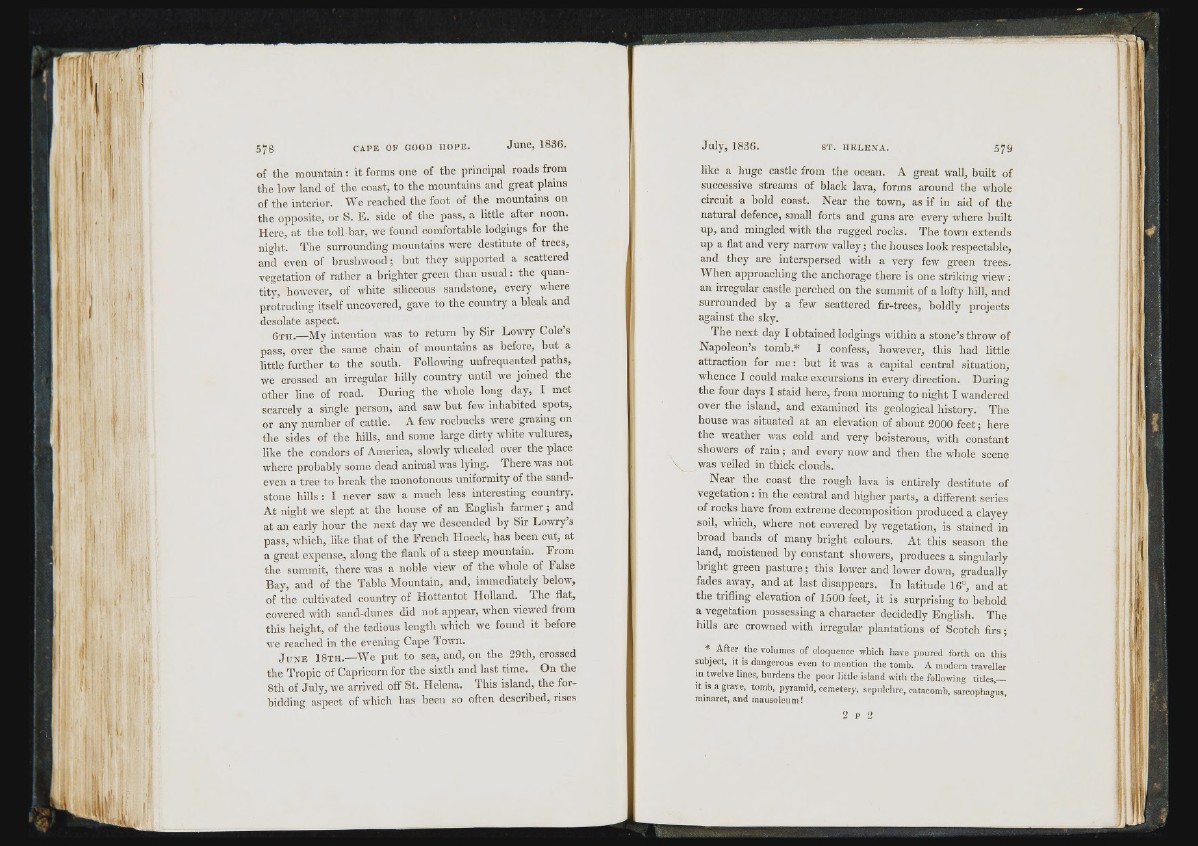
l i T
578 C A P E O F G O O D H O P E . June, 183G.
of the mountain: it forms one of the principal roads from
the low land of the coast, to the mountains and great plains
of the interior. We reached the foot of the mountains on
the opposite, or S. E. side of the pass, a little after noon.
Here, at the toll-bar, we found comfortable lodgings for the
night. The surrounding mountains were destitute of trees,
and even of brushwood; hut they supported a scattered
vegetation of rather a brighter green than usual: the quantity,
however, of white siliceous sandstone, every where
protruding itself uncovered, gave to the country a bleak and
desolate aspect.
Gt h . My intention was to return by Sir Lowry Cole’s
pass, over the same chain of mountains as before, but a
little further to the south. Following unfrequented paths,
we crossed an irregular hilly country until we joined the
other line of road. During the whole long day, I met
scarcely a single person, and saw but few inhabited spots,
or any number of cattle. A few roebucks were grazing on
the sides of the hills, and some large dirty white vultures,
like the condors of America, slowly wheeled over the place
where probably some dead animal was lying. There was not
even a tree to break the monotonous uniformity of the sandstone
hills : I never saw a much less interesting country.
At night we slept at the house of an English farmer; and
at an earlv hour the next day we descended by Sir Lowry’s
pass, whilh, like that of the French Hoeck, has been cut, at
a great expense, along the flank of a steep mountain. From
the summit, there was a noble view of the whole of False
Bay, and of the Table Mountain, and, immediately below,
of the cultivated country of Hottentot Holland. The flat,
covered with sand-dunes did not appear, when viewed from
this height, of the tedious length which we found it before
we reached in the evening Cape Town.
J u n e 18t h . — We put to sea, and, on the 29th, crossed
the Tropic of Capricorn for the sixth and last time. On the
Sth of July, we arrived off St. Flelena. This island, the forbidding
aspect of which has been so often described, rises
July, 183G. S T . H E L E N A . 579
like a huge castle from the ocean. A great wall, built of
successive streams of black lava, forms around the whole
circuit a bold coast. Near the town, as if in aid of the
natural defence, small forts and guns are every where built
up, and mingled with the rugged rocks. The town extends
up a flat and very narrow valley; the houses look respectable,
and they are interspersed with a very few green trees.
When approaching the anchorage there is one striking v iew:
an irregular castle perched on the summit of a lofty hill, and
surrounded by a few scattered fir-trees, boldly projects
against the sky.
1 he next day I obtained lodgings within a stone’s throw of
Napoleon’s tomb.* I confess, however, this had little
attraction for m e : but it was a capital central situation,
whence I could make excursions in every direction. During
the four days I staid here, from morning to night I wandered
over the island, and examined its geological history. The
house was situated at an elevation of about 2000 fe et; here
the weather was cold and very boisterous, with constant
showers of rain; and every now and then the whole scene
was veiled in thick clouds.
Near the coast the rough lava is entirely destitute of
vegetation: in the central and higher parts, a different series
of rocks have from extreme decomposition produced a clayey
soil, which, where not covered by vegetation, is stained in
broad bands of many bright colours. At this season the
land, moistened by constant showers, produces a singularly
bright green pasture; this lower and lower down, gradually
fades away, and at last disappears. In latitude 16°, and at
the trifling elevation of 1500 feet, it is surprising to behold
a vegetation possessing a character decidedly English. The
hills are crowned with irregular plantations of Scotch firs;
* A f te r th e v o lum e s o f e lo q u e n c e w liich h a v e p o u r e d fo rth o n th is
su b je c t, i t is d a n g e ro u s even to m e n tio n th e tom b . A m o d e rn tr a v e lle r
in tw e lv e lin e s , b u rd e n s th e p o o r little isla n d w ith th e fo llow in g title s ,—
It IS a g rav e, tom b , p y ram id , c em e tery , se p u lc h re , c a ta com b , sa rc o p h a g u s
m in a re t, a n d m a u s o le um ! » o .
■ i -
i i t
I ■ I.